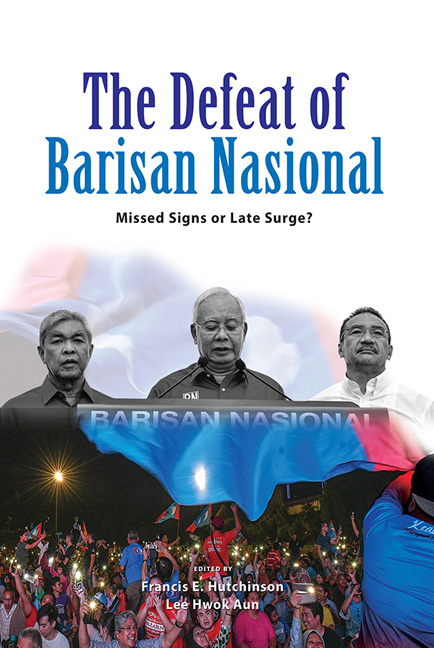12 - Selangor: Pakatan’s Home Advantage, Barisan’s Hollow Tactics, PAS’ Hardy Base
Published online by Cambridge University Press: 17 April 2020
Summary
INTRODUCTION
In the titanic theatre of Malaysia's GE-14, Selangor did not quite shake the foundations on 9 May 2018, but still served up big surprises. Against widely held expectations of modest results, Pakatan Harapan retained the Selangor state government by a landslide, and wrested a pair of federal parliament seats from its already dominant position (Lee 2018). Moreover, the fledgling coalition secured yawning margins, obliterating the notion that multicornered contests might yield narrow wins. Emphatically, Pakatan Harapan (PH) reaped the advantages of its incumbency and popular administration, while Barisan Nasional's (BN) tactics rang hollow and could not redeem a damaged brand, and Parti Islam SeMalaysia's (PAS) core remained loyal, but its ethnically homogeneous base and parochial platform consigned it to a near wipe-out.
Selangor was a prized trophy heading into GE-14. It is the most populous, prosperous and urbanized state in Malaysia, accounting for 19 per cent of the national population, and together with Kuala Lumpur where millions of Selangorians work, generates 38 per cent of the national GDP. The state's median household income of RM7,225 per month is also 38 per cent above the national median (Department of Statistics 2017). Governing Selangor grants levers to showcase prestige and progress, distribute patronage, determine land use, and oversee state government-linked companies and state-owned entities. Two million registered voters, of which 50.2 per cent identify as Malay, 34.0 per cent as Chinese, 14.5 per cent as Indian, and 1.3 per cent as Others, would decide the winners and losers in the contest for fifty-six state assembly seats and twenty-two federal parliament seats.
It was crucial for PH to retain the state, to shore up its popularity and relevance— and morale, in the event of losses elsewhere. BN declared retaking Selangor as a top priority, and directed the federal government machinery, particularly the Election Commission (EC), towards engineering more favourable conditions. The situation in Selangor was also complicated by PH's continual relationship with PAS, despite the cessation of the Pakatan Rakyat coalition at the federal level. Chief Minister Azmin Ali's calculated truce with PAS until February 2018 seemingly stemmed from fear of a backlash in the Malay electorate should PAS be alienated. Concerns over how Malay votes would be split were coupled with considerations that non- Malay voters might be disillusioned about regime change, and lulled into a lower voter turnout.
- Type
- Chapter
- Information
- The Defeat of Barisan NasionalMissed Signs or Late Surge?, pp. 279 - 309Publisher: ISEAS–Yusof Ishak InstitutePrint publication year: 2019



